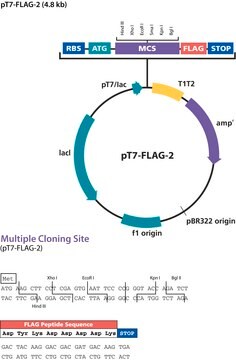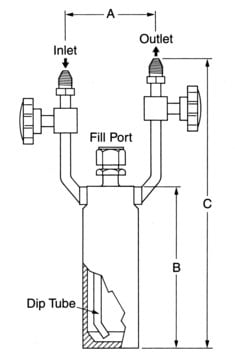UC0E01
UCOE® Single Expression Puromycin Vector Set
Synonym(s):
UCOE Mammalian Protein Expression Vectors, UCOE Mammalian Protein Expression Plasmids, Ubiquitous Chromatin Opening Element , UCOE01
Sign Into View Organizational & Contract Pricing
All Photos(1)
About This Item
UNSPSC Code:
41106621
eCl@ss:
34360190
Recommended Products
shipped in
dry ice
Quality Level
Related Categories
General description
The Ubiquitous Chromatin Opening Element (UCOE) technology offers significant advances in recombinant mammalian protein expression. Unlike traditional vectors, UCOE-containing vectors have the capacity to ease the process of isolating cell line clones that express high-levels of recombinant proteins. UCOE sequences promote reproducible and stable high level expression of a linked gene by altering chromatin structure to a transcriptionally permissive state that negates epigenetic-mediated (e.g. DNA methylation) silencing.
CET 1019 HS-puro-SceI is a mammalian expression plasmid vector containing the mouse Rps3 UCOE upstream of a strong human cytomegalovirus (hCMV) immediate early promoter-enhancer element.
CET 1019 AS-puro-SceI is a mammalian expression plasmid vector containing the murine Rps3 UCOE upstream of a guinea pig CMV (gpCMV) promoter-enhancer element.
The CET 1019 HS-puro-SceI and CET 1019 AS-puro-SceI vectors possess the following features:
THIS PRODUCT IS ONLY AVAILABLE FOR SALE TO ACADEMIC INSTITUTIONS OR NOT-FOR-PROFIT ENTITIES FOR USE UNDER THIS PRODUCT LABEL LICENSE. FOR INFORMATION ON COMMERCIAL LICENSING OF THE PATENTED UCOE TECHNOLOGY, PLEASE CONTACT licensing@emdmillipore.com.
CET 1019 HS-puro-SceI is a mammalian expression plasmid vector containing the mouse Rps3 UCOE upstream of a strong human cytomegalovirus (hCMV) immediate early promoter-enhancer element.
CET 1019 AS-puro-SceI is a mammalian expression plasmid vector containing the murine Rps3 UCOE upstream of a guinea pig CMV (gpCMV) promoter-enhancer element.
The CET 1019 HS-puro-SceI and CET 1019 AS-puro-SceI vectors possess the following features:
- A multiple cloning site downstream of the UCOE-CMV combinations containing unique restriction enzymes to permit easy insertion of any gene of interest (cDNA or genomic)
- A polyadenylation element from the SV40 early region located downstream of the multiple cloning site for appropriate mRNA 3 end formation
- A puromycin antibiotic resistance gene for selection of stably transfected mammalian cells
- A β-lactamase gene for plasmid selection and propagation in the transformed prokaryotic cells in the presence of ampicillin
- An I-Scel homing restriction endonuclease site for linearization of constructs prior to the transfection into mammalian cells, which favors integration into the target cell genome via the pre-generated free DNA ends and thus retains the integrity of the UCOE-CMV-transgene cassettes
THIS PRODUCT IS ONLY AVAILABLE FOR SALE TO ACADEMIC INSTITUTIONS OR NOT-FOR-PROFIT ENTITIES FOR USE UNDER THIS PRODUCT LABEL LICENSE. FOR INFORMATION ON COMMERCIAL LICENSING OF THE PATENTED UCOE TECHNOLOGY, PLEASE CONTACT licensing@emdmillipore.com.
Application
Research Category
General Cell Biology
All
General Cell Biology
All
Research Sub Category
All
All
Ubiquitous Chromatin Opening Element (UCOE) technology offers significant advances in recombinant mammalian protein expression by removing epigenetic related gene silencing.
Components
1) 10ug CET 1019 HS-puro-SceI (+) Vector (CS221296)
2) 10ug CET 1019 AS-puro-SceI (+) Vector (CS221284)
3) 10ug SC HS-puro (-) Vector (CS221286)
4) 10ug SC AS-puro (-) Vector (CS221287)
2) 10ug CET 1019 AS-puro-SceI (+) Vector (CS221284)
3) 10ug SC HS-puro (-) Vector (CS221286)
4) 10ug SC AS-puro (-) Vector (CS221287)
Storage and Stability
Plasmids should be stored at -20C. Avoid repeated freeze-thaw events.
Other Notes
Concentration: Please refer to lot specific datasheet.
Legal Information
UCOE is a registered trademark of Merck KGaA, Darmstadt, Germany
Disclaimer
Unless otherwise stated in our catalog or other company documentation accompanying the product(s), our products are intended for research use only and are not to be used for any other purpose, which includes but is not limited to, unauthorized commercial uses, in vitro diagnostic uses, ex vivo or in vivo therapeutic uses or any type of consumption or application to humans or animals.
Storage Class Code
10 - Combustible liquids
WGK
WGK 2
Certificates of Analysis (COA)
Search for Certificates of Analysis (COA) by entering the products Lot/Batch Number. Lot and Batch Numbers can be found on a product’s label following the words ‘Lot’ or ‘Batch’.
Already Own This Product?
Find documentation for the products that you have recently purchased in the Document Library.
Michael Antoniou et al.
Genomics, 82(3), 269-279 (2003-08-09)
The genetic elements that are responsible for establishing a transcriptionally competent, open chromatin structure at a region of the genome that consists only of ubiquitously expressed, housekeeping genes are currently unknown. We demonstrate for the first time through functional analysis
Our team of scientists has experience in all areas of research including Life Science, Material Science, Chemical Synthesis, Chromatography, Analytical and many others.
Contact Technical Service





